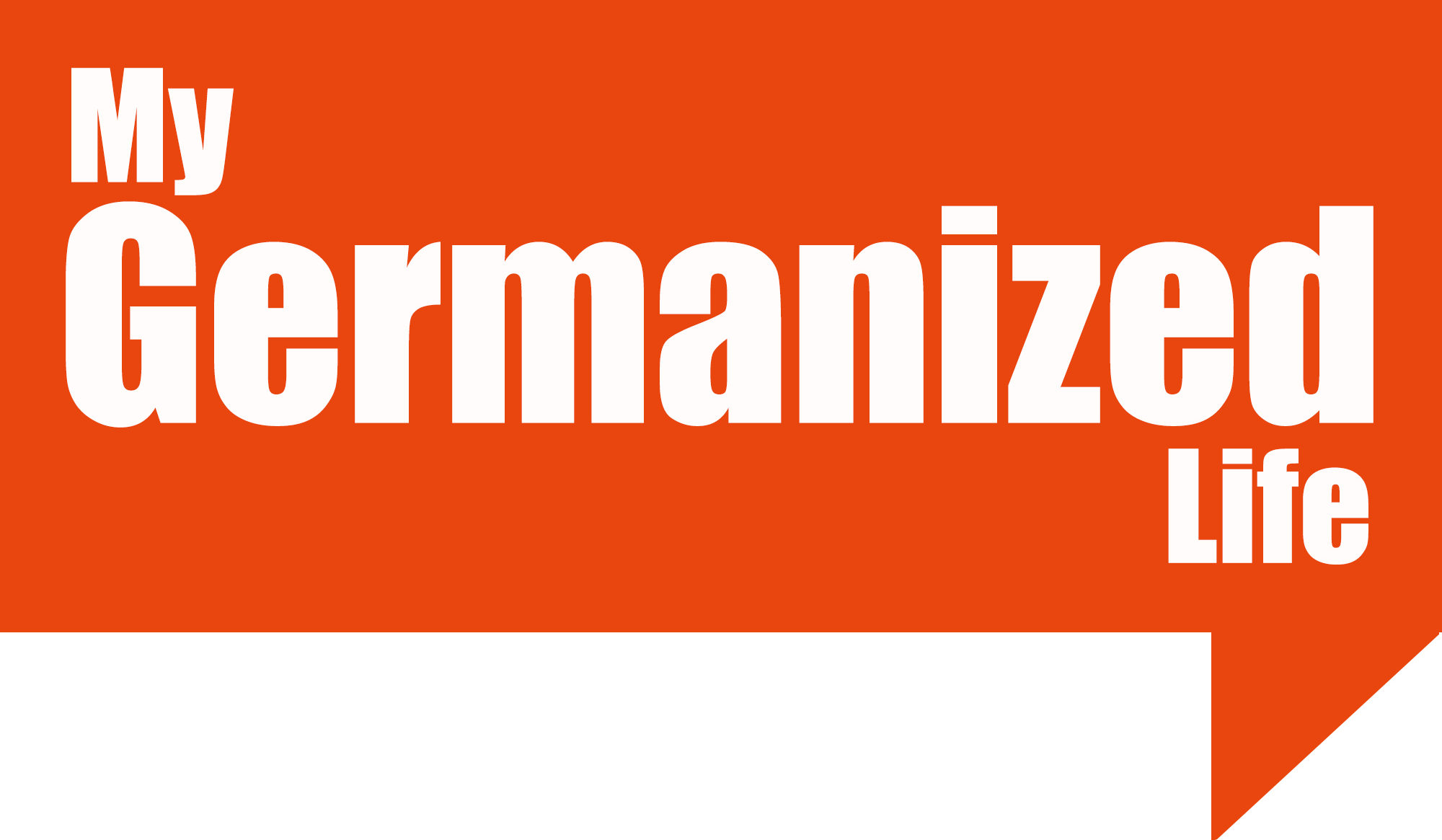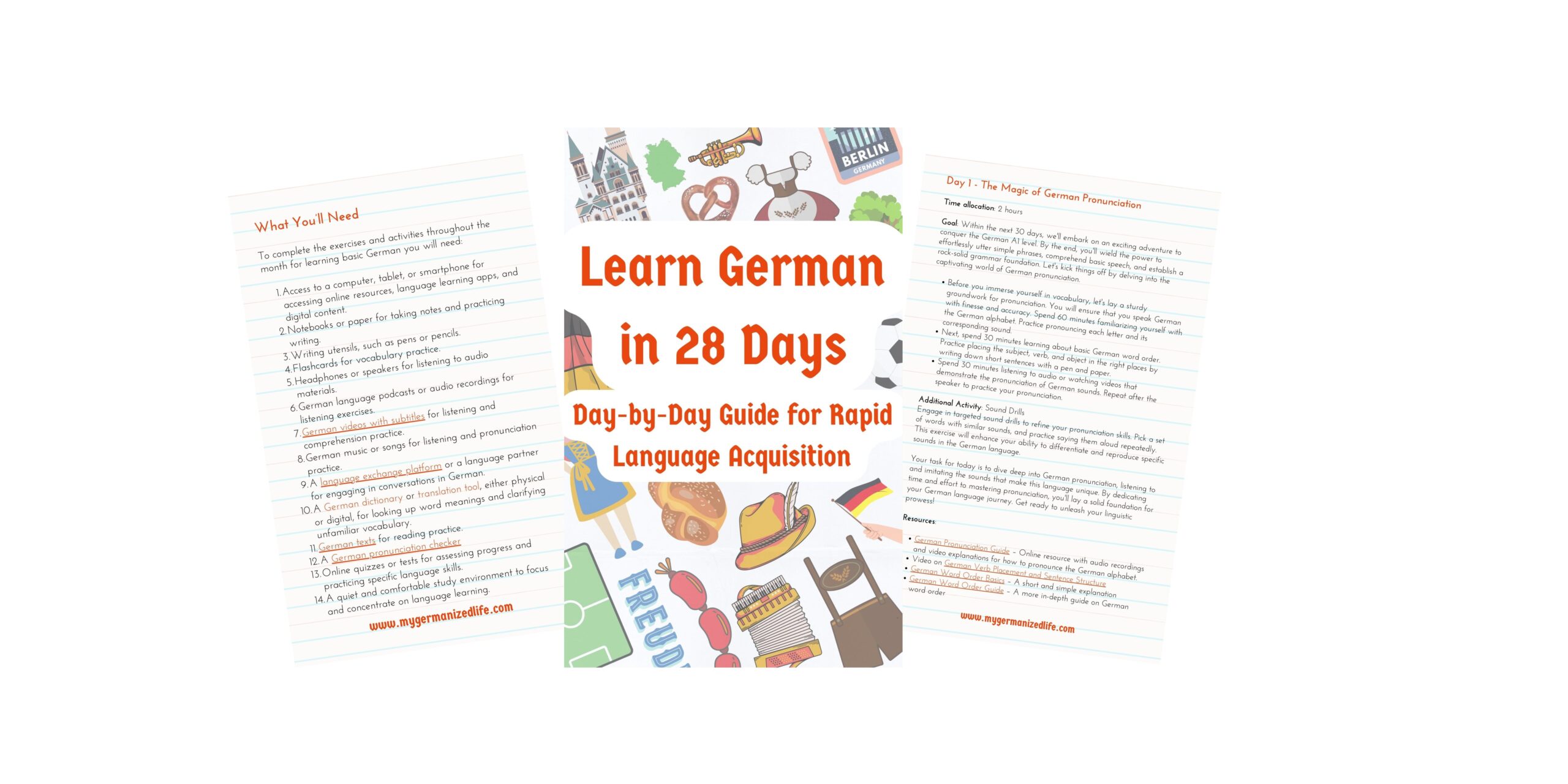Start Your Language Journey: Learn German in 28 Days!
Are you ready to immerse yourself in the rich world of the German language? Look no further! This comprehensive guide offers you a step-by-step and day-by-day roadmap to learn German in just 28 days. Whether you’re a beginner or have some prior knowledge, this 43-page in-depth plan is designed to help you achieve your language goals with intensive daily study of 2 to 3 hours.
Discover the Power of a Well-Structured Study Plan
Learning a language requires clear goals and a well-structured plan. Don’t waste precious time figuring out what to study each day. The meticulously crafted 28-day schedule covers everything you need to start conversing semi-fluently in German. Each day brings new topics, exercises, and resources, ensuring a balanced approach that covers the six core competencies: reading, writing, listening, speaking, vocabulary, and grammar.
You want to learn German, but there’s so much information online. How do you know where to begin? Is it even possible to learn German on your own? German isn’t that hard to understand for English speakers, but you need the right strategy. A better question to ask is, “How hard is it to teach myself how to learn German?”
You may have already gone through multiple language-learning attempts, only to get stuck at a certain point and give up. Learning should be a fun, immersive, and interactive process, not a chore. Below are my tips for beginning your German language experience on the right foot. You’ll find out how to assemble a game plan for learning German vocabulary, grammar, and pronunciation without growing gray hair.

Get Your Free 28-Day German Study Plan With Resources!

Free PDF Download: Your Key to Success
Learning should be accessible to everyone. That’s why you get this free PDF download of “Learn German in 28 Days.” This comprehensive resource provides you with a detailed outline of the 28-day plan, along with valuable tips, exercises, and links to resources for each topic. It’s the framework to guide your study and toward success. You can also adapt the pace for a three, six, or one-year German learning schedule.
Fast-Track Your Learning with Practical Resources
To make your language learning journey even more effective and enjoyable, take advantage of the wealth of practical resources. From suggestions for interactive language learning apps to engaging podcasts, online articles, virtual tours of Germany, and German TV shows, this curated collection of materials will enhance your learning experience and help you develop a natural feel for the language.
Unlock your Potential: Learn German A1 Fast
Don’t settle for slow progress when you can accelerate your learning. Our guide focuses on the A1 level, catering specifically to beginners. With carefully selected vocabulary, grammar explanations, and exercises, you’ll quickly grasp the fundamentals of the German language. Whether you’re planning a trip to Germany or simply eager to expand your linguistic horizons, mastering A1 German in just 28 days is within your reach.
Begin Your Language Adventure Today!
Take the first step towards your language goals. Download the free “Learn German in 28 Days” PDF and embark on a transformative journey. The guide, coupled with your dedication and daily commitment, will pave the way for a rewarding and fulfilling language learning experience. Don’t wait any longer – start learning German and unlock a world of opportunities!
How to Start Learning German: 5 Tips
Preparing yourself to go on an exciting language journey is the best way to learn basic German. Learning the German language doesn’t have to be difficult. Set yourself up for success using the tips below.
1. Make it Personal
First, you need to know your “why” for learning German. What’s your reason for learning the language, and how can it improve your life?
- Skip the first year of a second-language requirement at a University
- Communicate with long-lost family or friends
- Move forward with your career
- Connect with German influencers
- Read literature in the German language
- Live and work in Germany
- Study abroad in Germany for free
- Rediscover the Internet
- Play video games with German-speaking companions
You may have your own unique reason for wanting to learn German. As long as the purpose is motivational for you, you’re already on the right track.
2. Learn Smarter, Not Harder
Sure, you could start memorizing vocabulary terms and studying grammatical rules from multiple different sources. But, how long can you stick with this curriculum before it becomes overwhelming or tedious?
Learning German is a marathon race, not a sprint. Before you start diving into the details, figure out what you want to learn in German. You don’t need to study aspects of the language you won’t use, but you should have clear, achievable goals.
If your goal is to speak everyday German, you don’t necessarily need technical, medical, and scientific terms. The same process of elimination works on a smaller scale. For example, by learning the Words That Are The Same In German And English, you’ll be ready to start conversing in German about many of the topics that interest you.
3. Find Practice Opportunities
There are simple ways you can start talking and using German without leaving the comfort of your home.
- Start with children’s books
- Watch German movies, TV, and other video content
- Explore language learning apps
- Listen to music from Germany
- Find a language buddy online
- Check out Social Media groups for learning German
- Turn on the German subtitles while streaming your favorite shows
- Listen to podcasts
- Cook German recipes
Combining your German practice with other activities that you enjoy can help you learn the language in a goal-oriented way. When you’re first starting to learn, it’s not necessary to understand every single word. In fact, there could be many times when you don’t even understand the context.
Instead, focus on words that you recognize and can easily absorb without overexerting yourself. For example, let’s say you’re watching a film online in English with German subtitles. You notice the German word for a test drive at the bottom of the screen is “Testfahrt.” You and your friend start laughing about what the word sounds like in English. Positive, emotional-connected experiences like those will help you absorb vocabulary with minimal effort.
4. Learn About German Culture
Learning German isn’t just about translating sentences word for word back into your native English language. Part of learning a foreign language is understanding the culture of the countries that speak it. German, Austrian, Swiss, and other cultural influences have shaped how the language is used.
Be prepared to discover that German isn’t the most expressive language. You’re probably wondering what I mean. The English language is pretty flexible, allowing us to invent our own words and communicate the most subtle details using our speech. In contrast, German is a very straightforward language. You’ll need to say what you mean and mean what you say.
If you incorporate German culture into your studies, you’ll have a better idea of how you can use the new words, phrases, and grammar in practice. For example, you could gain a better understanding of when to address someone formally or informally.
5. Have Patience and Enjoy the Process
Learning German doesn’t happen overnight, but small and regular practice sessions can add up fast. Before you know if, you could find yourself speaking your first German sentences and amaze yourself with how many words you recalled. If you’re following the four previous steps, you’ve already laid the foundation for a promising start on your German language journey.
Ready to Learn German?
You’re trying to learn German online for free, but where should you start? My Germanized Life has you covered with tips and tricks for a successful language learning journey. Discover the shortcuts, cheatsheets, and memory techniques you need to make fast progress and foundation for understanding German.
Both English and German stem from the same language families, making German an excellent second language choice for English speakers. If you focus on the similarities instead of the differences, you can learn German in no time. All the information you need to learn German is already out there. Putting all these pieces together is the challenging part.


